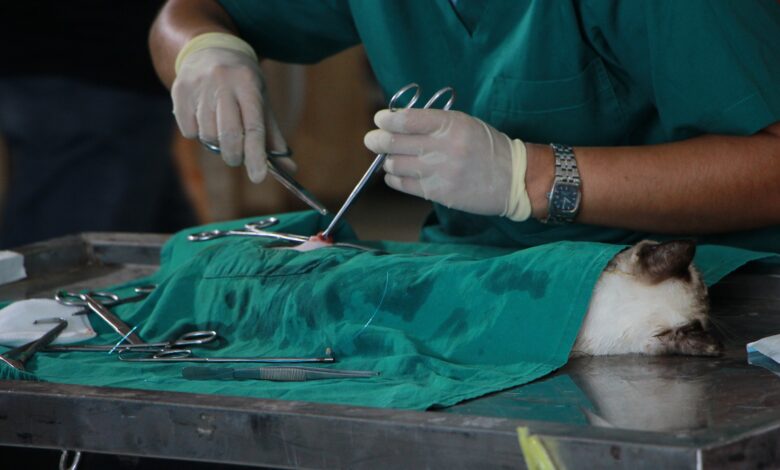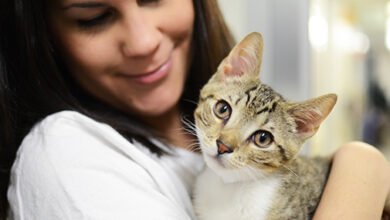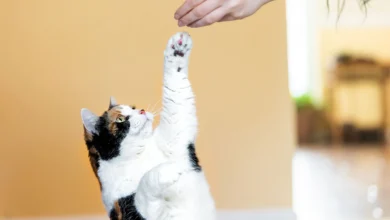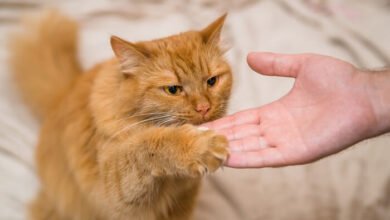
Protect Your Cat With Vaccinations
If you want to enjoy the companionship of a healthy and happy cat, 1 of the most important things you can do is to safeguard its health. Vaccinations can protect your cat from many common cat diseases.
Weaned From Mother’s Immunity
When your kitten is 6 to 8 weeks old, you should begin his vaccinations. Before this time, the mother’s antibodies have been protecting him. Once he is weaned, however, he will need to develop antibodies of his own.
The Vital First Visit
The first office visit is when your veterinarian will give your kitten a complete physical examination. A fecal exam is normally done to assure that your kitten doesn’t have worms.
Prior to vaccinations, your veterinarian should do a blood test to be sure the kitten is not already infected with Feline Leukemia.
The vet may also test for Feline Infectious Peritonitis. These tests are quick, and your veterinarian will have preliminary results in minutes.
If your kitten is not already infected with 1 of these diseases, the vet will give your kitten his first Feline Leukemia and FIP vaccines, assuming if he is at risk for these diseases.
An only cat who never leaves home may not need these vaccines, in which case your veterinarian may recommend against giving them.
Whether he leaves the house or not, your kitten should receive his first FVRCPC vaccine. This combination vaccine protects kittens from rhinotracheitis, calicivirus, panleukopenia and chlamydia.
Follow-Up Vaccines And Worming
Within 2 to 4 weeks your kitten should visit the veterinarian again, at the age of 8 to 12 weeks. This time he will get a second round of shots for FVRCPC, Feline Leukemia, and FIP.
If your kitten was wormed during his first visit, the vet will give him his second worming. If your kitten is at least 12 weeks old and spends time outdoors, he should also receive his first Rabies vaccine.
Your kitten‘s third visit to the veterinarian takes place when he is 10 to 16 weeks old, when he will receive his third FVRCPC vaccine. Kittens who were too young for their first Rabies vaccine on their previous visit will receive it at this time.
The First Birthday Visit
After completing his third set of FVRCPC vaccines, your kitten will not need any more injections until he is 1 year old. At that time he will need Rabies and FVRCPC booster shots.
If the Rabies shot is given to your cat within 1 year of his first Rabies vaccine, it will be good for 3 years. Your cat will need to return each year, however, for the FVRCPC vaccine.
When your cat is 1 year of age, he will also receive boosters for FIP and Feline Leukemia if he received these vaccines as a kitten.
Rare Side Effects
Most of the time vaccines are quite safe, yet occasionally side effects can occur. Vaccines for Feline Leukemia can sometimes cause a form of cancer at the site of the injection.
For this reason veterinarians usually do not recommend the vaccine for cats who are not at risk. A tumor can sometimes occur at the site of other vaccinations, as well.
This type of tumor can often be removed before it spreads. Should you notice a lump developing at the injection site, call your veterinarian without delay.
These lumps usually are a simple allergic reaction to the injection, but a lump can develop into a tumor, which, if caught early, can be successfully removed.
The risk of catching a disease without vaccinations is much higher than the risk of side effects. Just as with humans, shots are an unpleasant, but necessary part of growing up healthy.
To Stay Happy And Healthy Your Kitten Will Need Vaccinations
As a cat owner, you have a responsibility to protect the cat. One of the things you’ll need to do is to have the cat vaccinated.
6-8 weeks old
The first vaccination will need to happen when he is about six to eight weeks old. Before now, his mother’s antibodies are helping to protect him. But, once he is weaned from the mother, he needs his own antibodies to protect him.
The vet will give your kitten a physical exam which will likely include a fecal exam to insure that the cat doesn’t have worms.
Before vaccinating them, they will do a blood test to insure that the does not already have Feline Leukemia or Feline Infectius Peritonitis.
These tests don’t take long to be done, likely only minutes. The first vaccine to be received will likely be Feline Leukemia and FIP vaccines. Cats that never leave their home may not need these vaccines.
But, all cats are likely to receive FVRCPC vaccine even if he never leaves home. This vaccine is actually a combination of several vaccines. FVRCPC protects kittens from rhinotracheitis, calicivirus, panleudopenia and chlamydia.
10-12 weeks old
Two to four weeks later, you cat will need to visit the vet again. This time he will get his second FVRCPC vaccine and his second FIP and feline Leukemia vaccines as well.
He may get a second worming too if he had one at his first visit. When they reach twelve weeks old, those cats that spend time outdoors will also need their first rabies vaccine.
The next visit will happen at ten to sixteen weeks old. The third FVRCPC vaccine will be given. And some cats will get their rabies shot now too.
1 year old
At one year old, the cat will need Rabies and FVRCPC vaccines again. If the rabies shot is given within one year of the first one, it will be good for up to three years.
The cat will return though for FVRCPC vaccines each year. He’ll also receive boosters of FIP and Feline Leukemia as well.
Your pet needs these vaccines to stay healthy. Although they are meant to help your pet stay healthy, the cat may develop a reaction to the injection itself.
Although rare, the cat can develop a cancer from the Leukemia vaccines and that is why they are not recommended for cats that do not need them.
Also, cats can develop lumps or tumors as well. It is important that you make sure to let the vet know if there are any signs of these things with your pet.
When you follow these simple steps your kitten should be assured a happy and healthy future.
cat vaccinations,anti rabies vaccine for dogs,feline leukemia vaccine,kitten,sneezing in cats,hairballs in cats,






Reading your article helped me a lot and I agree with you. But I still have some doubts, can you clarify for me? I’ll keep an eye out for your answers.
Thanks for sharing. I read many of your blog posts, cool, your blog is very good.